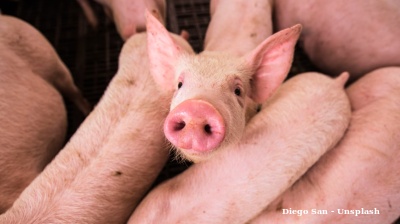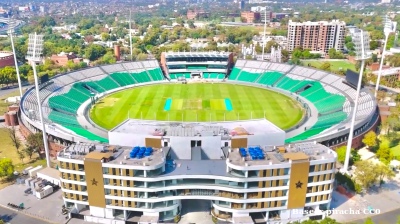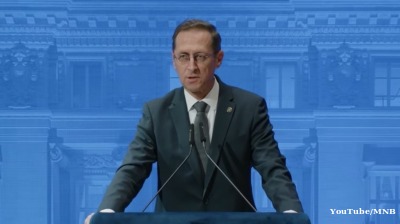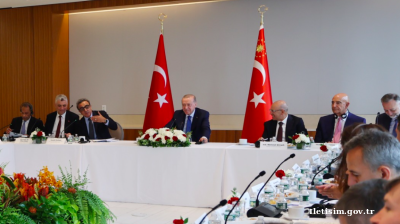The US won’t extend the General Licence 9A (GL9A), that has allowed the Russian state and its companies to make debt service payment in dollars to international investors, which could result in a cascade of defaults, the US Treasury Department Office of Foreign Assets Control (OFAC) said on May 24.
"OFAC will not renew the provisions of GL-9A <…> that expire on May 25, 2022 at 12:01 a.m. EDT," it said in a notice on its website reports Tass.
Without the licence it will be very difficult for either the state or corporations to make debt obligation payments, and will force them into default. Investors worry that if even small amounts of debt go into default that could trigger a cascade of defaults, as many bonds carry clauses that allow their holders to demand immediate redemption if other bonds go into default.
The GL9A was issued at the start of March to permit Russia to make payments in dollars on debt that would otherwise be sanctioned to meet redemptions and coupon payment obligations.
So far, both the state and leading Russian corporations have met all their obligations and paid them in the currencies specified in the bonds’ covenants despite the Kremlin’s threat to make the payments in rubles if the OFAC made it impossible to pay in dollars.
But it has not been easy. Although the GL9A allows for the dollar payments, most Russian companies trying to make due payments have had a lot of problems. With wave after wave of sanctions being imposed on Russia – a sixth package of sanctions is currently under discussion – that are increasingly targeting Russia’s finances, the compliance departments of international banks are shying away from allowing any transaction associated with Russia from going through their banks, even if it is perfectly legal.
Following the imposition of SWIFT sanctions, Russia has been effectively excluded from the international payment system, although so far only seven out or more than 370 Russian banks have been included in the SWIFT sanctions.
Russia has managed to meet all its debt obligations since the start of the war in Ukraine on February 24 and the subsequent imposition of extreme sanctions, albeit with great difficulty. Russian Railways and privately owned steel producer Severstal had particular difficulty in making their payments.
Investment banks are reporting that correspondent banks and payment agents have been insisting on the Russian payers getting explicit assurances from the OFAC. All the Russian companies making bond payments reported problems with payments getting bogged down as the international banks sought explicit reassurances from OFAC that no secondary sanctions would be applied if they handled the payments.
Both the Kremlin and the corporates have made it clear they are keen to meet their obligations and maintain their credit ratings. The Russian state and companies are worried about being labelled as defaulters, as that will make it difficult or impossible to raise debt on the international markets in the future. Even if Russians have been barred from the capital markets in the US and Europe they can still go to markets in Asia such as Hong Kong, Singapore and Shanghai, but there too, any bond they issue will be priced with the default label being taken into account, so increasing the costs.
Removing the GL9A exemption greatly increases the chances that Russia will now be forced to default on its bonds.
General Licence 9A “authorises US persons to receive interest, dividend or maturity payments on debt or equity of the Central Bank of the Russian Federation, the National Wealth Fund of the Russian Federation, and the Ministry of Finance of the Russian Federation through 12:01 a.m. eastern daylight time on May 25, 2022. After May 25, 2022, US persons would require a specific licence to continue to receive such payments.”
The next bond that comes up for payment is a coupon payment on a €26.5mn bond and another on a $71.25mn that are both due on May 27. The euro-denominated bond has provisions for payment in pounds sterling and rubles and this payment is likely to be met without problems. The dollar tranche has provisions for payment in euro, sterling and Swiss francs, also allowing a way to pay that avoids the sanctions.
However, anticipating problems, the Ministry of Finance sent the money early on May 20 to the payment bank, but it is not yet clear if the investors have received it yet.
Another two bonds for $183.75mn and $51.1mn due on June 23 also have provisions for payment in euro, sterling and francs, so it should also be possible to avoid sanctions in this instance.
The first really problematic bond will be a June 24 coupon payment on a $159.4mn bond that matures in 2028 that can only be paid in dollars and, if Russia does not get a special licence to allow for dollar payments from the OFAC, is a candidate for a default.
If Russia is barred from making payments in dollars then the Ministry of Finance will offer to pay in rubles, something that it has already done. Indeed, in March it bought back a bond that matured on April 4 by offering investors the face value plus interest – if they would accept payment in rubles, not foreign exchange. Given that most of Russia’s bonds have been deeply discounted since war broke out, three quarters of the bondholders (many of them Russian entities) accepted the offer.
Russia has some $75bn of outstanding debt, but with a total external debt of only 15% and an estimated current account surplus of some $200bn forecast for this year, the government has enough money to cover its bond obligations several times over. If the OFAC forces Russia into default – and if an offer to pay the obligations in a currency other than that stipulated in the covenant is considered to be a default – then the Kremlin has said it is likely to seek legal recourse via the courts.
News

MOL says no risk to domestic fuel supply after Danube refinery blaze
Fires broke out at refineries in both Hungary and Romania in recent days.

Taiwan confirms first African swine fever outbreak
Authorities detected the virus on a pig farm in Wuqi District, Taichung, after 117 pigs died between October 10 and 20.

Afghanistan withdraws from Pakistan tri-nation T20 to protest murder of three local cricketers
The Afghanistan Cricket Board says it has secured clear video footage implicating the Pakistan state in an attack that killed three local cricketers.

Sanae Takaichi makes history as Japan’s first female prime minister
In her first press briefing as leader, the 64-year-old pledged to drive reform with confidence and determination, describing her administration as one “ready to decide and move forward.”



